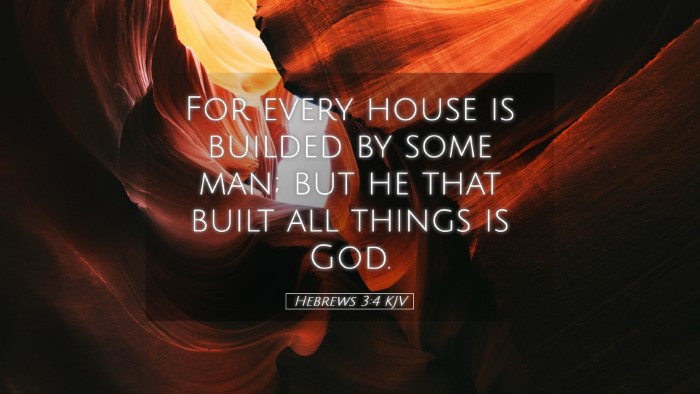Old Testament
Genesis Exodus Leviticus Numbers Deuteronomy Joshua Judges Ruth 1 Samuel 2 Samuel 1 Kings 2 Kings 1 Chronicles 2 Chronicles Ezra Nehemiah Esther Job Psalms Proverbs Ecclesiastes Song of Solomon Isaiah Jeremiah Lamentations Ezekiel Daniel Hosea Joel Amos Obadiah Jonah Micah Nahum Habakkuk Zephaniah Haggai Zechariah MalachiHebrews 3:4
Hebrews 3:4 KJV
For every house is builded by some man; but he that built all things is God.
Hebrews 3:4 Bible Commentary
Commentary on Hebrews 3:4
Verse: "For every house is built by someone, but the builder of all things is God." (Hebrews 3:4)
Introduction
This verse emphasizes the divine authorship of all creation and serves as a profound reminder of the sovereignty of God over all that exists. The author of Hebrews skillfully employs an analogy drawn from the realm of construction to illustrate a spiritual truth about God's nature and His role as the ultimate architect of the universe.
Exegesis and Theological Insights
Hebrews 3:4 can be understood through various lenses, including its theological implications, literary context, and its application for believers today.
The Contrast of the House and the Builder
1. Metaphorical Construction: The image of a house signifies the created order, symbolizing both the physical universe and the community of faith. Just as a house cannot exist without a builder, the world around us stands as evidence of a divine creator. Matthew Henry discusses this metaphor, emphasizing that recognizing the house is only possible when one understands the existence of the builder, who, in this case, is none other than God Himself.
2. The Nature of God as Architect: Following the insights of Albert Barnes, it becomes evident that the phrase "the builder of all things is God" reflects His omnipotence and creative authority. God is depicted not merely as a passive observer but as an active participant in the creation and sustenance of all things. This reinforces the theological principle that all creation is contingent upon God's will and design.
Construction vs. Creator
3. The Dignity of the Creator: Adam Clarke points out that this verse draws a clear distinction between the creator and creation. Each house is built by a specific individual, indicating the uniqueness and purposefulness behind every act of creation. In contrast, everything that exists ultimately finds its origin in the divine mind and purpose of God, underscoring the majesty and sovereignty of the Creator above His creations.
4. The Role of Humanity: The implication of this verse is significant for humanity's role as both stewards of God’s creation and participants in the ongoing construction of spiritual “houses.” Pastors and theologians are reminded that their ministry is a collaboration with God, where they endeavor to build up the Church and strengthen the faith of believers by preaching the Word, much like builders erecting a structure on a solid foundation.
The Context of Hebrews
Hebrews 3:4 stands within a larger theological discourse that contrasts Christ with Moses. The previous verses establish the superiority of Christ as the Son of God over Moses, who served merely as a servant in God’s house. Here, the imagery of a house not only illustrates the creation but also links the identity of Christians to a greater reality as members of the house (or family) of God through Christ. Understanding Christ's role as the architect and sustainer of this spiritual edifice is vital.
Servants in God’s House
As the author of Hebrews transitions from discussing Moses' faithful service (Hebrews 3:2) to Christ's divine nature, it serves to elevate the conversation about leadership and ministry. The references to "every house" and their builders invite leaders to understand their place in God’s grand design, emphasizing that they are servants working under the authority of the ultimate Builder, who is Christ.
Practical Applications
- Affirming the Sovereignty of God: This passage invites pastors and students to reaffirm their belief in the sovereignty of God over all creation and ministry endeavors. Every church program, outreach, and gathering should reflect acknowledgment of God as the Builder, leading to a heart of dependence on His guidance.
- Fostering Unity in the Body of Christ: Understanding that the Church is God's house constructed through the work of the Holy Spirit fosters a sense of unity among believers. This shared identity reinforces collaboration in ministry rather than competition, emphasizing that all members have roles and purposes within God's plan.
- Encouragement for the Weary: For those who feel overwhelmed by the demands of ministry, knowing that God is ultimately responsible for the growth of His Church brings comfort. Each believer can find peace in trusting that while they labor to build, it is God who gives life and growth.
Conclusion
Hebrews 3:4 serves as a profound declaration of God's ultimate authority as the builder of the universe, framing our understanding of creation and His relationship to humanity. When pastors, students, and theologians reflect on this verse, they are reminded that they are part of a larger divine plan, crafted by the Creator's design. May we all act as faithful stewards of this spiritual house, recognizing the greatness of our Builder and the beauty of His creation.


